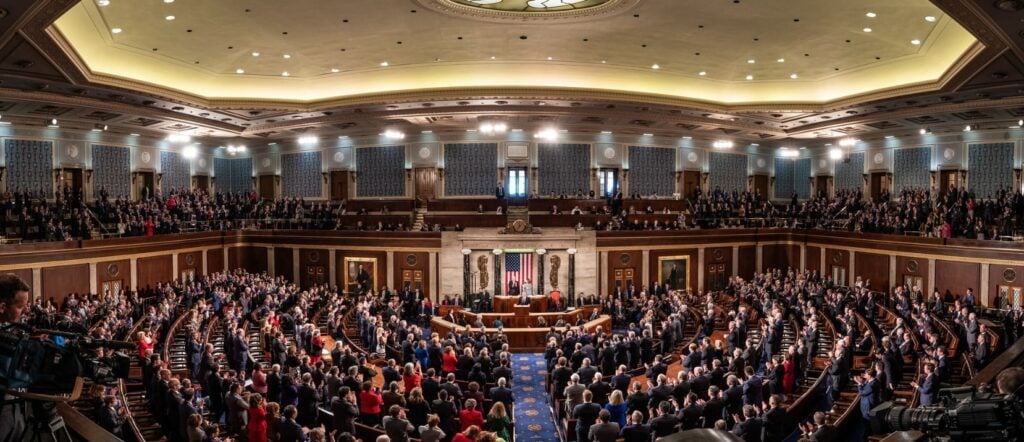
Clean energy trade bodies ACP, ACORE and SEIA have denounced an attempt by Republicans to roll back the Act, which has spurred unprecedented investment in the US market.
House Bill ‘H.R.2811 – Limit, Save, Grow Act of 2023′, put forward by Republican Representatives passed in the House yesterday (26 April). It would significantly scale back the the federal support for renewable energy and energy storage enabled by the Inflation Reduction Act (IRA), which came into law this year, as well as other non-energy federal financial support schemes.
Enjoy 12 months of exclusive analysis
- Regular insight and analysis of the industry’s biggest developments
- In-depth interviews with the industry’s leading figures
- Annual digital subscription to the PV Tech Power journal
- Discounts on Solar Media’s portfolio of events, in-person and virtual
“This bill increases the federal debt limit and decreases spending. It also repeals several energy tax credits, modifies the permitting process and other requirements for energy projects, expands work requirements for the Supplemental Nutrition Assistance Program (SNAP) and other programs, and nullifies regulations for the cancellation of federal student loan debt,” the Bill reads.
The Bill “…repeals or modifies tax credits for renewable and clean energy, energy efficient property, alternative fuels, and electric vehicles”.
‘Putting private sector investment in clean energy at risk’
Clean energy trade bodies have been quick to slam the move, pointing out that the Inflation Reduction Act (IRA) has spurred billions in investment and created thousands of high-paying jobs since it was announced.
The American Council on Renewable Energy (ACORE) said: “With passage of the Limit, Save, Grow Act of 2023, House Leadership is attempting to halt the nation’s accelerating momentum toward a clean energy future. The IRA tax incentives that would be repealed by this legislation have spurred American companies to announce dozens of new clean energy generation and manufacturing projects that are driving economic development, lowering energy costs, and creating good-paying jobs in red and blue states across the country.”
American Clean Power Association (ACP) CEO Jason Grumet, pointing to this being part of a broader debt ceiling debate, said: “No American industry enjoys being used as a pawn in partisan political negotiations. The American Clean Power Association is nevertheless confident that Congress and the Administration will not interrupt the burst of private sector investment in American clean energy production and manufacturing.”
The potential repeal of the Inflation Reduction Act came up during a panel discussion at last month’s Energy Storage Summit USA in Austin, Texas.
Developer Jupiter Power’s Caitlin Smith said there was state-led pushback to the Act and that there was the potential for lawmakers to “muddle the legislation”, but law firm MWE’s Carl Fleming said reckoned that “…at a federal level, you can’t unwind this.”
The Bill would also establish discretionary spending limits for FY2024-FY2033, nullify parts of planned student loan debt cancellation, and establish new work requirements for non-energy federal schemes like Medicaid, SPAN and TANF.
The Republic representatives bringing the bill, primarily Jodey Arrington and Greg Murphy, are also hoping to increase investments in the country’s fossil fuel sector.
“The bill also includes various provisions related to the development of energy resources such as oil, natural gas, and minerals. For example, the bill requires additional federal oil and gas leasing, reduces or eliminates certain royalties and fees, and expedites the permitting process for various energy projects,” it reads.
The Solar Energy Industries Association (SEIA) pointed out that new solar module manufacturing investment announcements since the Act would bring the US’ capacity to 47GW a year, and cautioned strongly against rolling it back.
“Repealing the IRA will stop this investment in its tracks, pulling the rug out from under the communities that are counting on these factory jobs,” it said.
“Playing games with the debt limit has very real consequences for businesses, workers and the entire economy. The IRA is expected to create an additional 200,000 jobs and US$600 billion in private investment in the solar industry alone over the next decade. Companies need to trust that the policy landscape will remain stable in order to put forward this level of capital, and it’s up to responsible lawmakers to ensure that certainty remains.”






